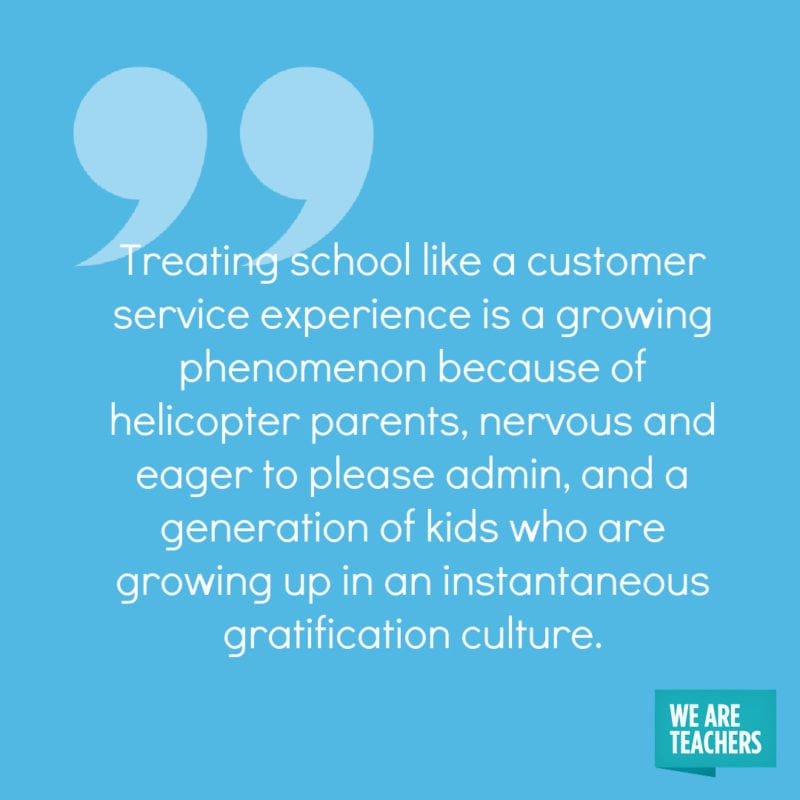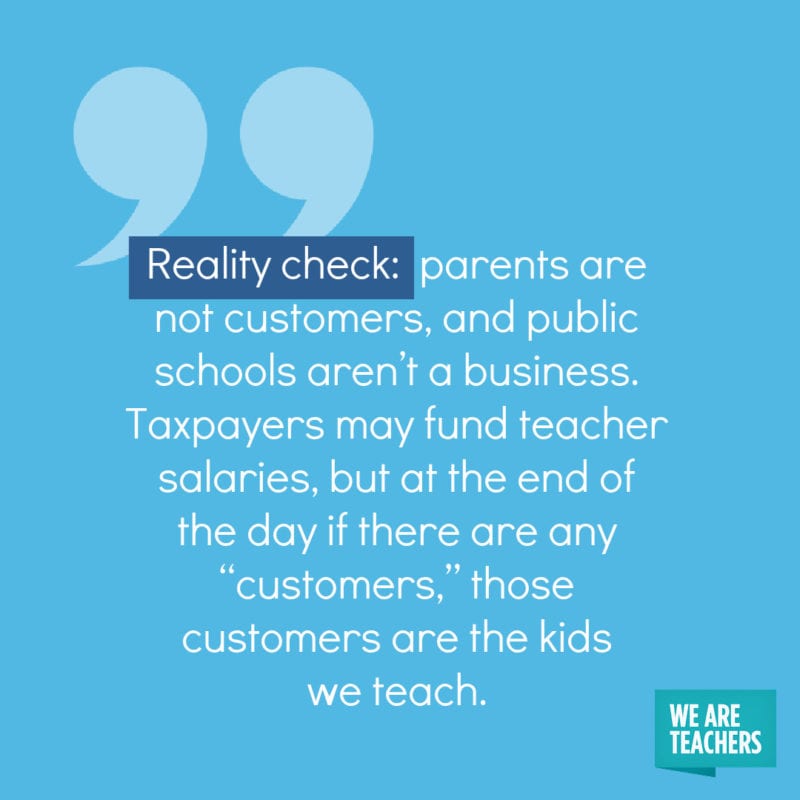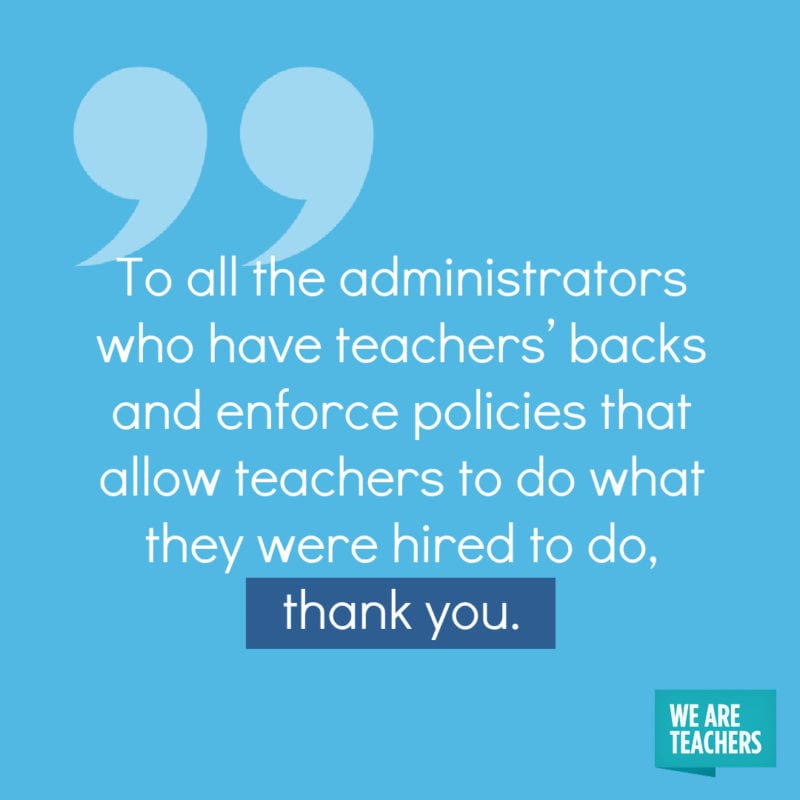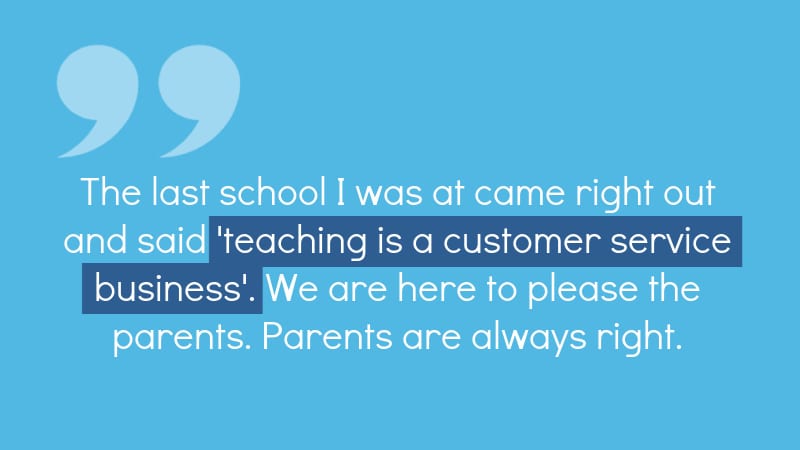Your student’s family is going on a vacation to Hawaii two weeks before winter break, and you get an email the night before they leave asking you to make copies of all of his work and drop it off at their house. Sound familiar? If you’re a teacher who feels like you have to please your students (all 100 of them!), and their families, you aren’t alone. These days, teaching is starting to feel a lot like customer service. But what happens when “the customer isn’t always right?” What’s the cost if we listen attentively and let them vent? Apologize even if we don’t agree? This isn’t what we signed up for.
Why are we treating teaching like customer service?
Treating school like a customer service experience is a growing phenomenon because of helicopter parents, nervous and eager-to-please admin, and a generation of kids who are growing up in an instantaneous gratification culture. Treating the teacher like “the help” who is there to make everything fun is so problematic. Recent events have only added fuel to the fire. Teachers feel responsible for making sure the kids are alright, even at the expense of their own physical and mental health. The lines between school and home have been blurred so much that what a teacher is responsible for feels different due to COVID-19. There’s no easy answer to why this has happened or what we can do about it. However, it’s clear that we need a reality check.

People-pleasing isn’t part of teacher training
People-pleasing is exhausting. I’ve yet to meet a teacher who doesn’t feel like they have to “grin and bear it” and “put on a happy face,” even when a parent is making unreasonable demands (why didn’t you text me back on Sunday night?). Unfortunately, this is the norm for many teachers. A teacher in our Facebook group shared, “the last school I was at came right out and said ‘teaching is a customer service business.’ We are here to please the parents. Parents are always right. If the parent’s not happy, the school’s not happy.” Wow. What about the teacher’s happiness? Not to mention sanity? Another teacher reported, “‘the customer is always right’ attitude isn’t fair. Some parents straight up lie, then come at you about it, and you still have to be diplomatic and calm. Sometimes, I just really want to give a parent a piece of my mind.”
Teachers don’t owe anyone a flawless experience
So many of us are perfectionists when it comes to our teaching. We feel immense pressure to please students and families and make sure that they are happy. Reality check: parents are not customers, and public schools aren’t a business. Taxpayers may fund teacher salaries, but at the end of the day, if there are any “customers,” those customers are the kids we teach. If we model striving for perfection, what lesson are we teaching them? Do we want our students to feel that they have to do everything perfectly? I think it would be much better for us to teach them that learning is messy, no one is perfect, and mistakes are part of being human. Teachers aren’t superheroes, and it is important that our students understand that. Sometimes just showing up is enough, and you don’t have to make a Bitmoji classroom or create beautiful Pinterest worthy slide decks to be a good teacher.

School isn’t always going to be easy or fun
The pressure to keep everything fun and easy and make everyone happy is intense. A teacher in our group shared, “even if I have done everything in my power to make sure parents and students are happy … if they aren’t happy, that somehow falls on me. I still need to do whatever will satisfy their want, no matter how crazy or absurd it is.” Of course, teachers want their students to have fun (they go to great lengths to plan engaging lessons), but they also know that students learn a lot from grappling with challenges, making mistakes, failing, and trying again. If our students expect school to be easy and fun all the time, then they are going to be very unhappy, and they won’t have the coping skills needed to get through challenging and stressful times. Not to mention, most schools demand that teachers maintain high levels of rigor. Teachers have to show proof that students are meeting standards and ready to perform well on standardized tests.
Teachers shouldn’t be expected to give instant responses
A teacher shared that he feels like he’s on call. “Sadly, some parents don’t understand boundaries. Last week on Thanksgiving break, I had one parent text me over the weekend. I ignored it. Like the students, we get holiday breaks as well. That’s not to say I take my job lightly. But like the saying goes, if you don’t ever take time to come apart for a while, you may just plain come apart!” Many teachers said that their administrators expect them to call and text parents regularly, especially if students are not showing up for their Zoom classes or doing work.
This makes me wonder: when does teaching stop and parenting begin? Why do so many families expect teachers to manage students long after school is over for the day? In many ways, the pandemic has made it even harder for teachers to feel ok about stepping away from their work. Teachers are worried about their students and know that families are under significant stress due to COVID-19. Yet, it isn’t sustainable for teachers to be on call 24/7. This is where supportive admin come in. We need school leaders who will hold the line for teachers and enforce school policies that protect teachers’ work/life boundaries.
Teachers sometimes have to give real, hard feedback
It’s never easy to be the bearer of bad news. Teachers take no pleasure in communicating academic and behavior problems to their students’ families. But it’s part of the job. This year there is a real pressure to give students more flexibility. Physical and mental health is most important right now, not whether or not a child has mastered long division. Yet, teachers are also trying to make sure that students don’t fall significantly behind. It’s a difficult balancing act right now as teachers know that remote learning isn’t equitable, and not every student has the tools they need to be successful. But that doesn’t mean that teachers should take the blame. If a student doesn’t show up for a Zoom class or isn’t doing their work, that doesn’t mean that it is the teacher’s fault.
Treating teaching like it is customer service has consequences
Because of this expectation that teachers keep parents and students happy and accommodate everyone even at their own expense, teachers are overwhelmed, exhausted, and have little time to themselves. Fortunately, not all schools treat teaching like customer service. To all the administrators who have teachers’ backs and enforce policies that allow teachers to do what they were hired to do, thank you. Thank you for treating teachers like the professionals they are and for being the first line of defense when a parent or student is unhappy that school isn’t always easy or fun. After all, teachers never asked to work in customer service or run a business; all they ever wanted to do was teach.

Need a place to connect with other teachers? Join the WeAreTeachers Helpline group on Facebook.
Plus, be sure to check out 27+ Free Counseling Options for Teachers.


